Institutional Context
Summary
London South Bank University is a modern, dynamic entrepreneurial university based in the heart of South London. Our mission is to deliver impactful research and practice-led learning, transforming lives, communities and businesses locally and across the world.
We are a sector leader in professional and technical education collaborating with industry to train 3000 apprentices and upskill over 4000 local residents. We are driving growth through London’s largest funded regeneration portfolio (£23.4m) and have supported 1,500 organisations to bring innovations to market in priority sectors including Net-Zero, creative, digital and health.
We are proud to be positioned 5th in the world for Reducing Inequality (THE Impact rankings) and were highly commended as an Outstanding Entrepreneurial University in the 2022 THE Awards.
Institutional context
London South Bank University’s (LSBU) mission is to transform lives, communities, businesses and society through applied education and academic insight.
With our roots in South London, our commitment to this community is at the heart of our identity; and in order to better serve its needs, we have created the LSBU Group. Alongside the University, this includes South Bank Colleges, South Bank Academies and South Bank Innovation.
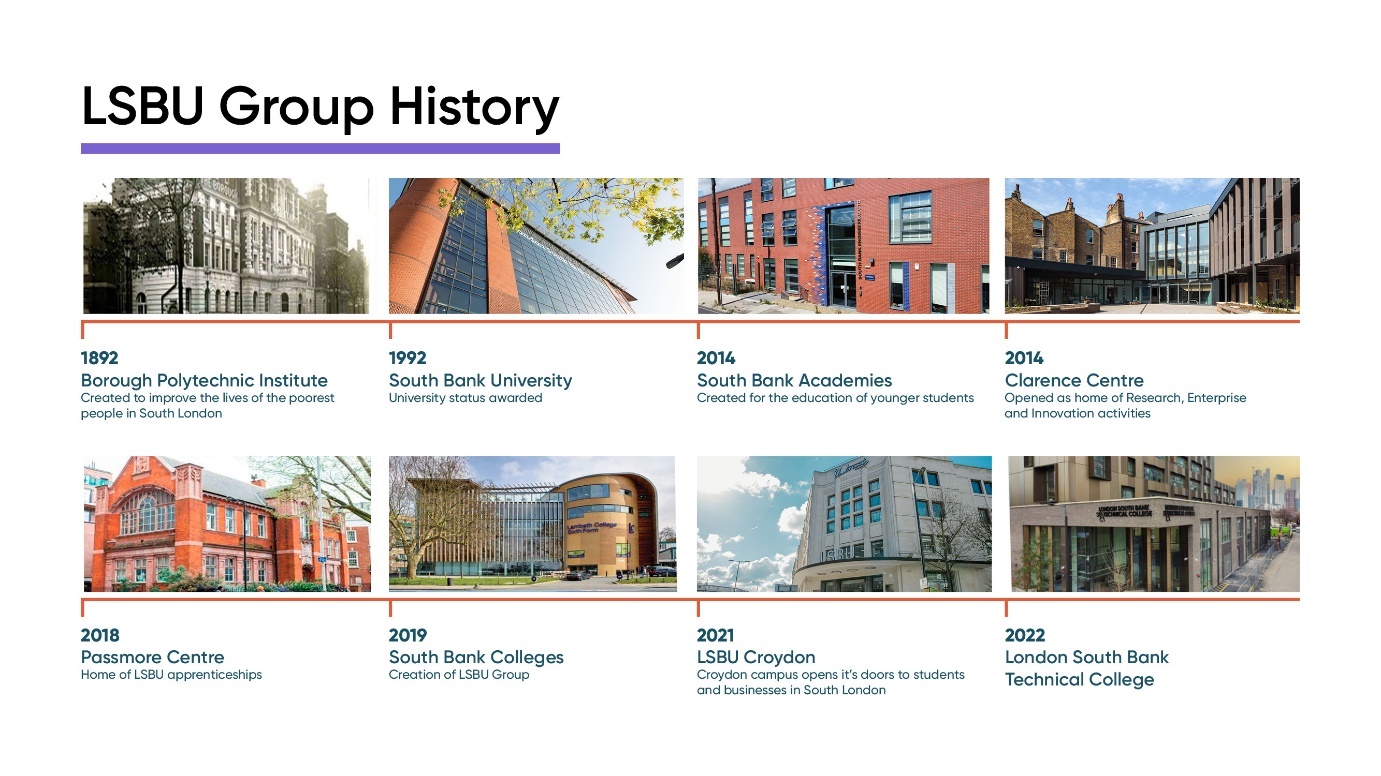
A recognised leader in professional and technical education, the creation of the Group has allowed us to develop clear educational pathways from secondary and further education into higher education; clearly aligned to employment and the needs of local businesses. This is demonstrated through our sector leading apprenticeship provision, working with over 500 business partners to train 3000 apprentices.
First class academic insight underpins everything we do, ensuring the delivery of our education and knowledge exchange (KE) activity is founded on a detailed understanding of our partners and leading-edge industry practices.
With an emphasis on impact through insight and engagement with place, the LSBU Group Corporate Strategy 2020–2025 commits the University to produce research and innovation that enhances teaching and generates critical insights that transform lives and sustain our progress of achieving GBP5,000,000,000 of economic impact by 2025.
Our knowledge exchange activity aims to stimulate inclusive growth by
harnessing Group research and KE expertise that provides coordinated
support to local businesses through access to facilities
and high-quality insight provided by our Research
Centres and Groups. With key strengths
in Net-Zero, Personal wellbeing, Community Health and Digital Futures,
our community of researchers work with over 1,500 organisations to
deliver innovations and insights that drive business
growth.
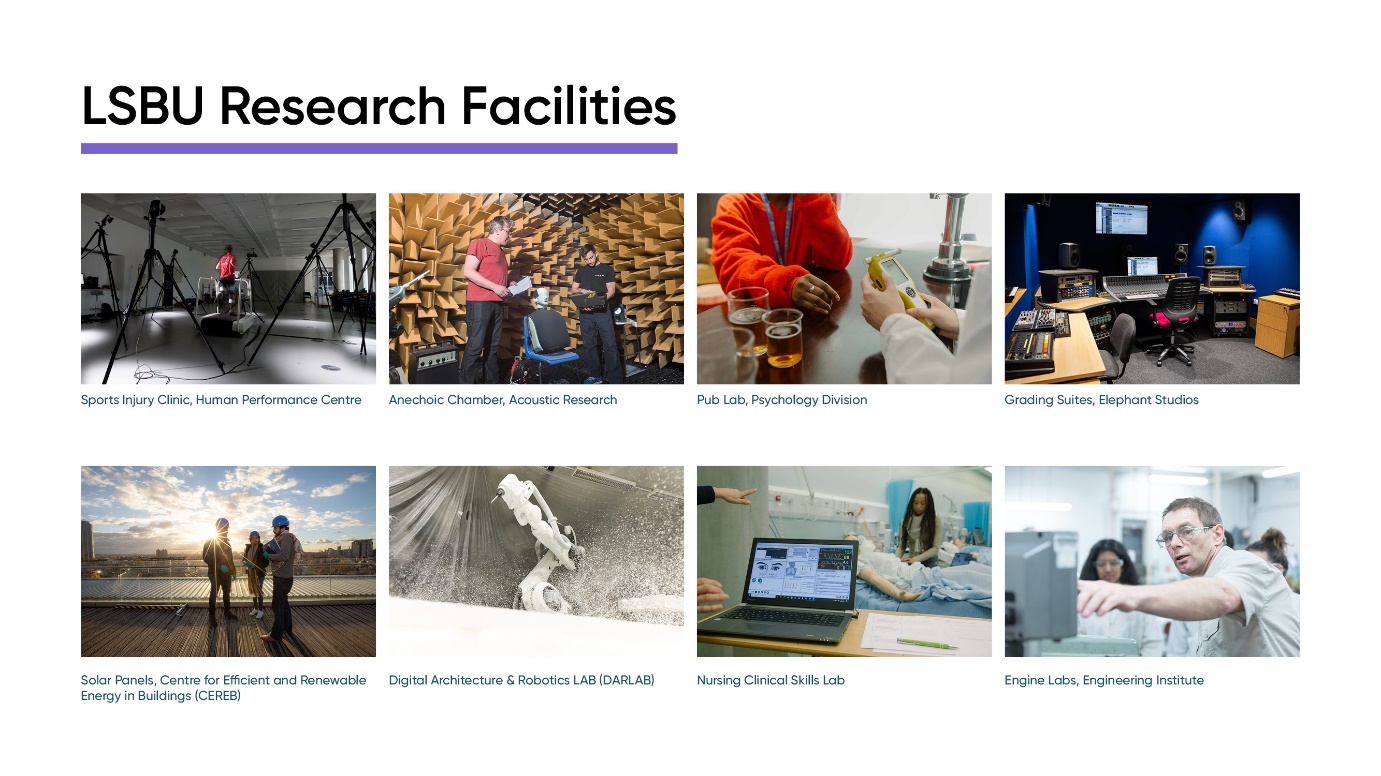
Knowledge exchange is supported by South Bank
Innovation, a dedicated team of KE
experts who drive the delivery of industry leading CPD,
research
partnerships and local
growth and regeneration initiatives. Our students are
central to the delivery of KE, as highlighted by our award-winning
student-led public services – including the Legal
Advice Clinic, Chiropractic
Clinic and Business
Solutions Centre, which helps over 100 businesses and 9,000
individuals per year.
The Clarence
Centre for Innovation and Enterprise is central to LSBU’s
knowledge exchange, offering a gateway for businesses and the community
to engage with the University, as well as providing dedicated office and
event space to over 60 SMEs.
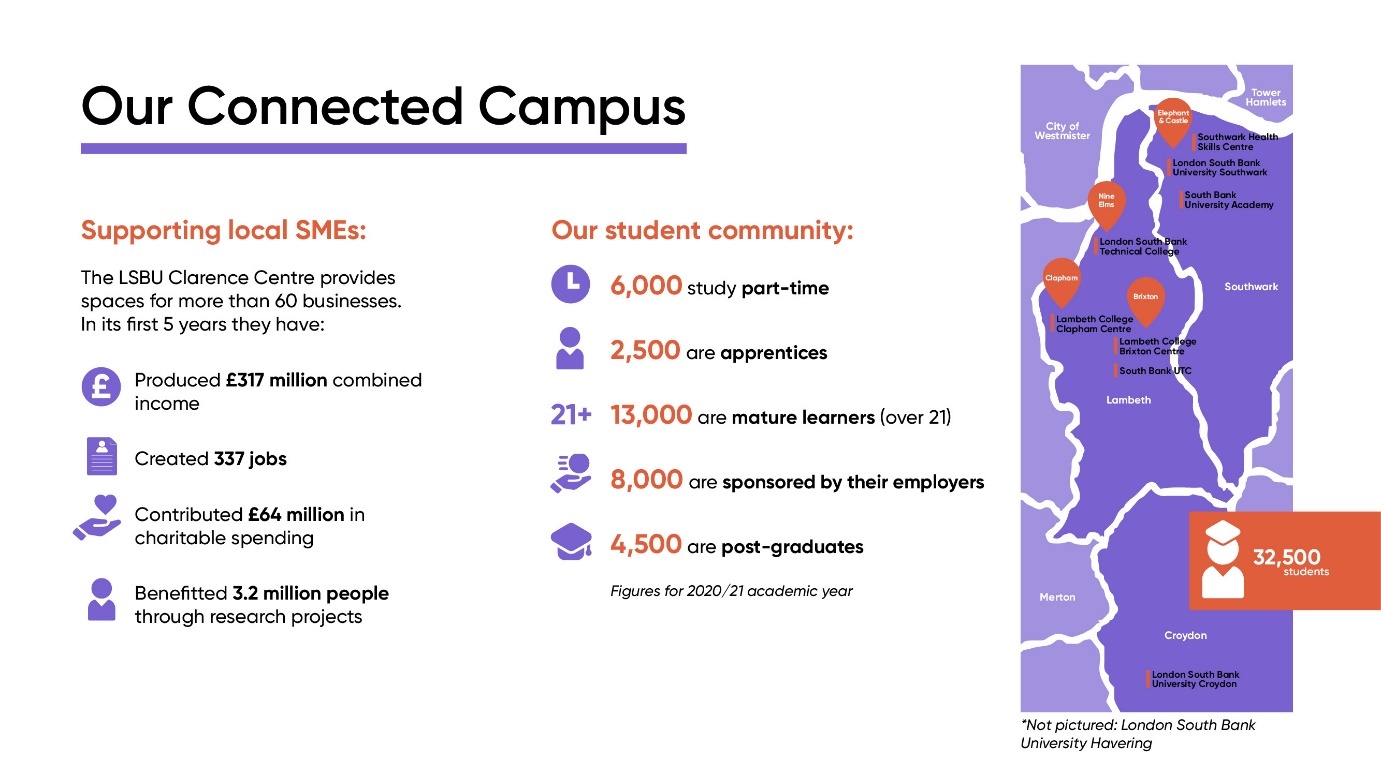
We work closely with our local boroughs and the Greater London Authority, using our insight and resources to support their strategic priorities, as well as supporting small businesses directly. We are a leader in the delivery of Local Growth and Regeneration funded projects. With a combined value of GBP23,400,000, our programmes have so far supported the development of 70 innovations for SMEs and trained over 4,200 local residents.
The impact of LSBU’s KE activity is nationally and internationally recognised. Celebrating our exceptional student entrepreneurship offer – which supports 3,000 students each year and has helped to launch over 200 graduate start-ups – LSBU was highly commended as an Outstanding Entrepreneurial University at the Times Higher Education Awards 2022.
For further information, please send queries to kef@lsbu.ac.uk
Local Growth and Regeneration
Summary of approach
Engagement with our locality to support growth and regeneration is a central theme of the LSBU Group strategy which outlines our mission to embed the university in our local communities, to drive economic and social impact. Our core local geography covers the South London boroughs of Lambeth, Southwark and Croydon. We work closely with the South London Partnership and collaborate more widely across London and the South East. The delivery of our strategic ambition centres around three key areas of work: business and innovation support, start-up and incubation, and skills development. Activity is mainly delivered through externally funded collaborations with several local partners.
Aspect 1: Strategy
The LSBU Group strategy 2020-25 demonstrates our vision to create a vibrant educational hub in South London; transforming lives, communities, businesses and society through applied education and insight. We aim to make a ‘real and measurable impact’ through our teaching, research, knowledge exchange and community engagement, embedded in both our local and global communities.
Our local growth and regeneration strategy centres on three key objectives:
Drive regional workforce development through sector leading professional education, aligned with local industry needs.
Advance local enterprise growth through business innovation initiatives underpinned by world-class academic insights.
Reduce entry barriers for underrepresented business owners, providing access to knowledge and funding to help their businesses scale.
Our strategy is complemented by the LSBU Group Civic Statement which similarly sets out our civic mission to work with partners in delivering local socio-economic growth.
By 2025, we aim to expand our local growth and regeneration offer beyond our central South London locality. LSBU’s establishment of the first ever University in Croydon, gives us the platform to accelerate this aim, providing the opportunity to work with new partners, enterprises, and support organisations which previously would not have had access to leading research facilities and workspace. We are continuing to develop our strategic relationships and delivery beyond our immediate South London locale, working with boroughs and partner organisations across London and the South East.
To better understand the socio-economic and growth needs of our sub-region, we continue to evolve our routes to engagement:
Engagement with local boroughs: We have strengthened relationships with our immediate boroughs of Lambeth and Southwark by signing Memorandums of Understanding (MOUs) setting out local growth priorities and the LSBU Group’s role in supporting the delivery of key local aims, such as training and development, Net-Zero and the inclusive economy. As part of our strategic expansion, we have developed working relationships and joint initiatives with the five boroughs of the South London Partnership sub-region (Richmond, Kingston, Merton, Sutton and Croydon).
Engagement with the Greater London Authority (GLA): Over the past five years, LSBU has been the largest university provider of European Structural funded projects in London. This has strengthened our understanding of the policy priorities of the GLA and the needs of the businesses we support. LSBU chairs the London-wide European Regional Development Fund Practitioners Group and has been an active participant in consultations on the development of the new UKSPF programme in London.
Engagement with other civic groups: LSBU is an active member of local chambers of commerce and business representative groups, including the local Business Improvement Districts and enterprise agencies in Southwark, Lambeth and Croydon. We regularly work with a range of grassroots delivery partners which support disadvantaged groups.
Project Delivery: We are currently delivering several business support, innovation and skills support projects in London and the South East. We have robust evaluation and feedback loops through which we collate the views and experiences of participants which help us better understand their challenges, barriers and needs.
Identification of local growth needs
Working closely with the GLA and our local boroughs, and applying our own research expertise, we continue to grow our understanding of sub-regional needs. For example, we have recently undertaken evaluation work into high street recovery and inclusion as part of Lewisham and Southwark’s post-COVID economic recovery planning. Delivering our Hi3 project in Maidstone has helped us understand the creative and digital ecosystem in and around Kent. Our new Croydon hub has been developed in close consultation with the local authority, ensuring our offer is aligned with local skills needs and supports economic growth; this has led to the borough actively investing over GBP300,000 in our new science and innovation centre which focuses on developing technology to support applications in Net-Zero and Health.
We recently undertook a full evaluation of our local growth and regeneration offer, interviewing over 20 external stakeholders. The report found that we have an excellent reputation for efficient delivery of business, innovation and skills support, and that our physical business space at the Clarence Centre in Southwark is a highly valued asset as a regional hub to support local enterprises in a post-COVID recovery environment.
In 2020, we were commissioned by the South London Partnership to evaluate the local innovation ecosystem to inform the development of a GBP1,500,000 South London Knowledge Exchange programme. Our work found that awareness of the local knowledge base was low and the provision of innovation and growth support was limited, as was the uptake of collaboration opportunities via government funding schemes such as Innovate UK. We also identified a number of potential growth clusters including green, health and life sciences and creative industries. As a result, the BIG South London initiative has been jointly developed with 6 local universities, 3 FE colleges and 5 local boroughs.
We have built our local skills strategy around emerging sectors, particularly where employer need is greatest and in alignment with local borough aspirations. For example, we have worked closely with Lambeth, Southwark and Lewisham to develop construction and retrofit skills and employment pathways. We lead on the Mayors Green Skills Hub and Mayors Construction Academy and are active members of sub-regional skills boards.
Aspect 2: Activity
Our delivery strategy aims to use our expertise, assets and facilities to stimulate local growth by supporting local organisations and residents across three core modes of activity:
Business and innovation support
Start-up and incubation support
Skills development
A key driver in the strategy is our highly successful approach to securing external grant income. LSBU currently holds 15 regeneration and skills grants with a combined value of GBP18,000,000 which aim to support 1,505 enterprises and upskill 3,330 participants.
Business and innovation support
We are a major actor in London’s European Structural and Investment Funds (ESIF) programme, delivering against innovation priorities which aim to increase the proportion of SMEs engaging with the knowledge base. We lead on five programmes supporting SMEs across a range of sectors including health tech, low carbon and creative tech.
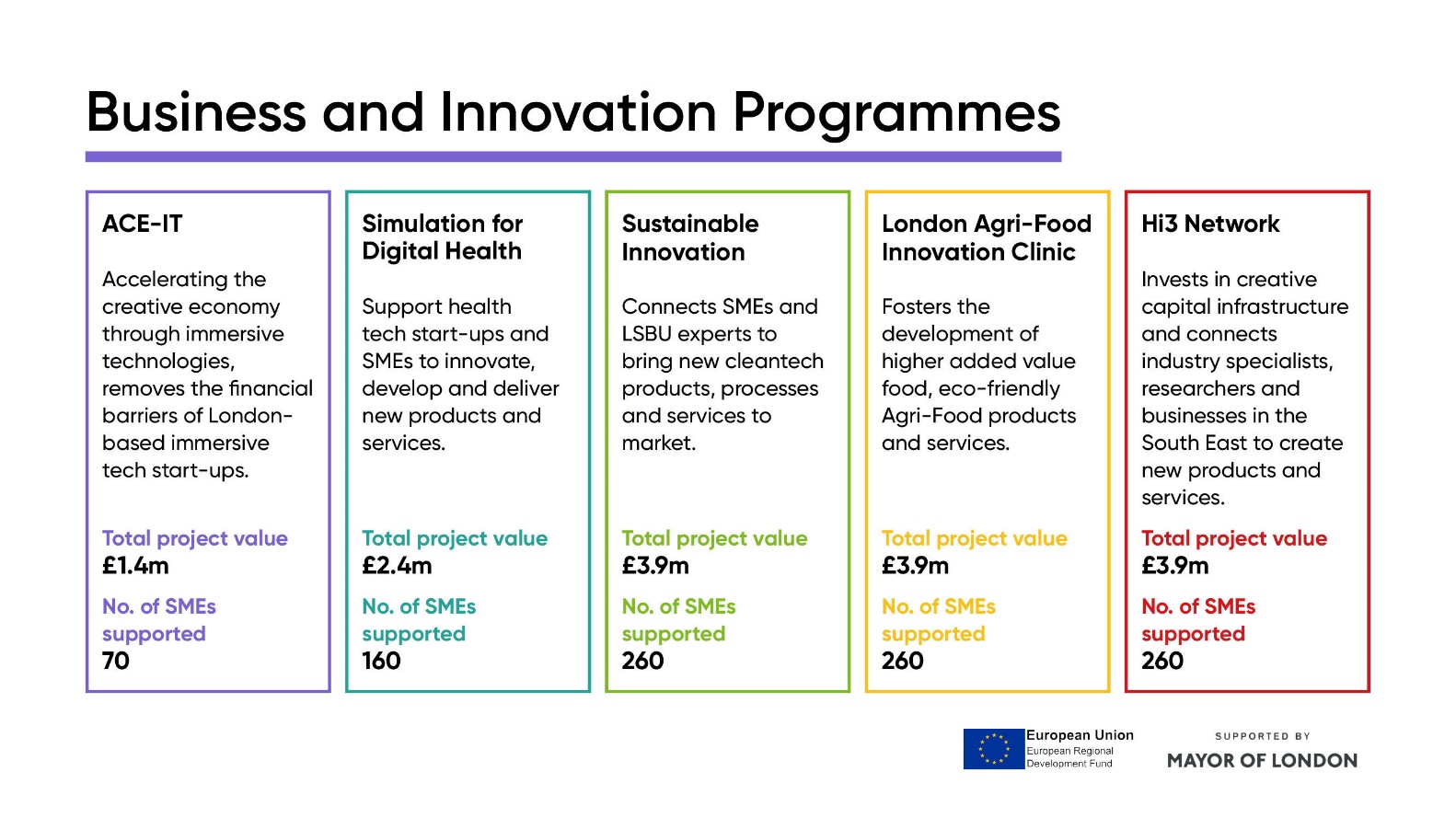
LSBU is a major delivery partner in BIG South London, a support programme which drives innovation-led economic growth, working with local businesses to improve their productivity. Activities have been co-designed with participating boroughs, partner universities and business support organisations. LSBU leads on three initiatives, partnering with five local boroughs alongside Kingston, Roehampton and St Mary’s Universities, and Sussex Innovation Centre (Croydon). Our programmes BIG Innovation Support Programme, BIG Integrate and BIG Low Carbon Network have encouraged local enterprises to develop new growth strategies, supply chains and collaborations with the local knowledge base. These programmes have a combined value of GBP567,000 and aim to support 270 businesses.
As part of our delivery and wider innovation offer, we have embedded an innovative student consultancy model via our Business Solutions Centre, run by the LSBU Business School, providing cross-sector ‘hands-on’ help to local micro-businesses.
We deliver our research and knowledge exchange activity regionally, supporting local communities to drive positive change through academic insights. Some of our contributions are recognised and celebrated through the Civic Map, collated and hosted by London Higher. The Civic Map visualises 26 research and innovation projects that LSBU has delivered across the Capital, the largest number of any London Higher member institution.
Start-up and incubation support
LSBU’s investment in the Clarence Centre for Innovation and Enterprise provides a platform for local growth and regeneration, acting as a flagship delivering our commitment to the physical and economic regeneration in our immediate locality. Impactful activities include:
SME tenants on-campus: LSBU’s campuses are home to more than 82 SME tenants in the voluntary, digital, professional services and health sectors. Tenants positively engage with the university through collaborative research projects, curriculum development and student success via internships and work placements. As part of our expansion plans, we are developing a new Science and Innovation Centre at our Croydon campus that will build on the same model, offering space and support in health, green and smart technologies.
Student, graduate and local entrepreneurs: The Clarence Centre has established itself as the epicentre of an institution-wide provision for increasing student and graduate engagement in enterprise and entrepreneurship. Since 2019 thousands of students, recent alumni, staff and members of the public have engaged in our sector-leading start-up support expertise. More broadly, our Enterprise Steps programme has helped over 650 early-stage London entrepreneurs start their business journey and grow to their full potential.
Skills Development
Our strategy targets funding and partnership opportunities in
sectors where we have identified gaps in mainstream provision and where
we can deliver soft skills and wrap-around support to accelerate a
participant’s journey into employment. As a result of our strategy and
collaborative work, we have secured and developed the following
projects:
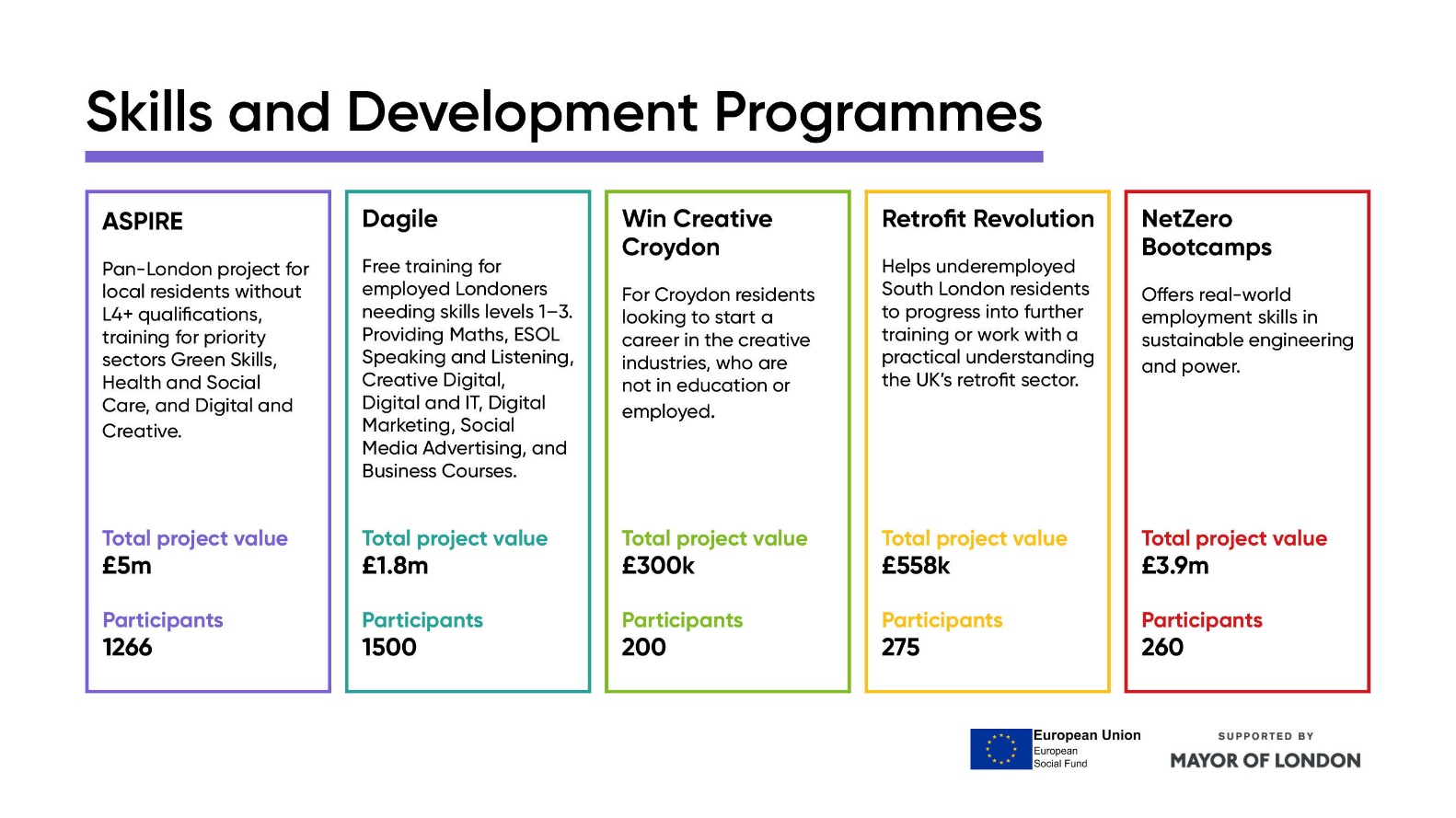
Apprenticeships. The LSBU group trains over 3000 apprentices from levels 4 to 7 for almost 500 employer partners, with employers sponsoring an additional 6,885 of our students. LSBU is also a skills, training and employment hub partner of the Mayor’s Construction Academy (MCA), working alongside three local Boroughs, three FE Colleges and Lewisham Construction Hub to assist employers and those wanting to work in the construction sector. Between January 2019 and March 2020, the MCA LSBU hub engaged with 764 employers.
Aspect 3: Results
We are proud of the impact and achievements of our work in supporting local enterprises and residents. By increasing collaboration and partnership with South London anchor institutions we are making a positive impact on the socio-economic development of South London.
Business and innovation support
Independent evaluations of our business support programmes affirm that participants highly value our bootcamps, workshops and 1-2-1 mentoring, enhanced by the opportunity to work with sector leading experts. Our programmes demonstrate high levels of customer satisfaction with over 80% of participants having their expectations met or exceeded. We are particularly effective at supporting early-stage entrepreneurs; 40% of SMEs supported are start-ups established within 12 months of receiving support. Our recent track record also shows we are especially effective in working with enterprises representative of London’s diverse communities; for example, over 60% of all business and training was with BAME owned companies.
Over the past five years, our support has nurtured over 190 new research collaborations. This has led to more than 200 new products, processes and services being introduced or launched to market. Case study evidence shows improved relationships with local businesses, generating long-term impact and additional opportunities.
Through our Sustainable Innovation programme, a London based start-up, Skipping Rocks Labs created a biodegradable alternative to single use plastic packaging. The capsules were used to refresh runners during the London Marathon, saving 30,000 plastic bottles.
Through our Simulation for Digital Health (SimDH) programme, a health tech startup, Dual Good Health developed a training programme by combining virtual reality and a resuscitation dummy to teach CPR skills in more realistic settings.
Our engineering and design expertise helped If.Vehicles develop an electric vehicle prototype, the If.Micro. Our collaboration resulted in the company securing seed investment of GBP750,000.
Our academic programmes put an emphasis on solutions that align with industry needs and solve real-world problems. Students from our BSc Product Design programme have received industry wide recognition at the Design Innovation in Plastic Awards, including Anap, a double capacity inhaler which combines both the preventer and reliever medications.
Start-up and incubation support
Between 2019 and 2021, LSBU delivered more than 250 activities to students and alumni, leading to the creation of over 200 businesses. This work has delivered local impact with approximately two thirds of those entrepreneurs residing in London and the local area. In recognition of our response to the pandemic, local impact and collaborative approach to enterprise education, the University was Highly Commended in the Times Higher Education Awards 2022 in the category Entrepreneurial University of the Year.
Stephen Addison, a recent business graduate took part in LSBU’s ‘Make it Happen’ competition and received funding to support his startup BoxUp Crime, a social enterprise which offers boxing training programmes for young people from disadvantaged backgrounds and at risk of expulsion from school. In 2022, Stephen was awarded an honorary Doctorate in recognition for his work helping young and vulnerable people.
Through the provision of affordable workspace at our Southwark and
Croydon Campuses, our tenants have achieved a combined turnover of
GBP294,000,000. Our tenants are active members of the LSBU and local
community, providing over 100 employment opportunities and supporting
over 30 student placements and internships.
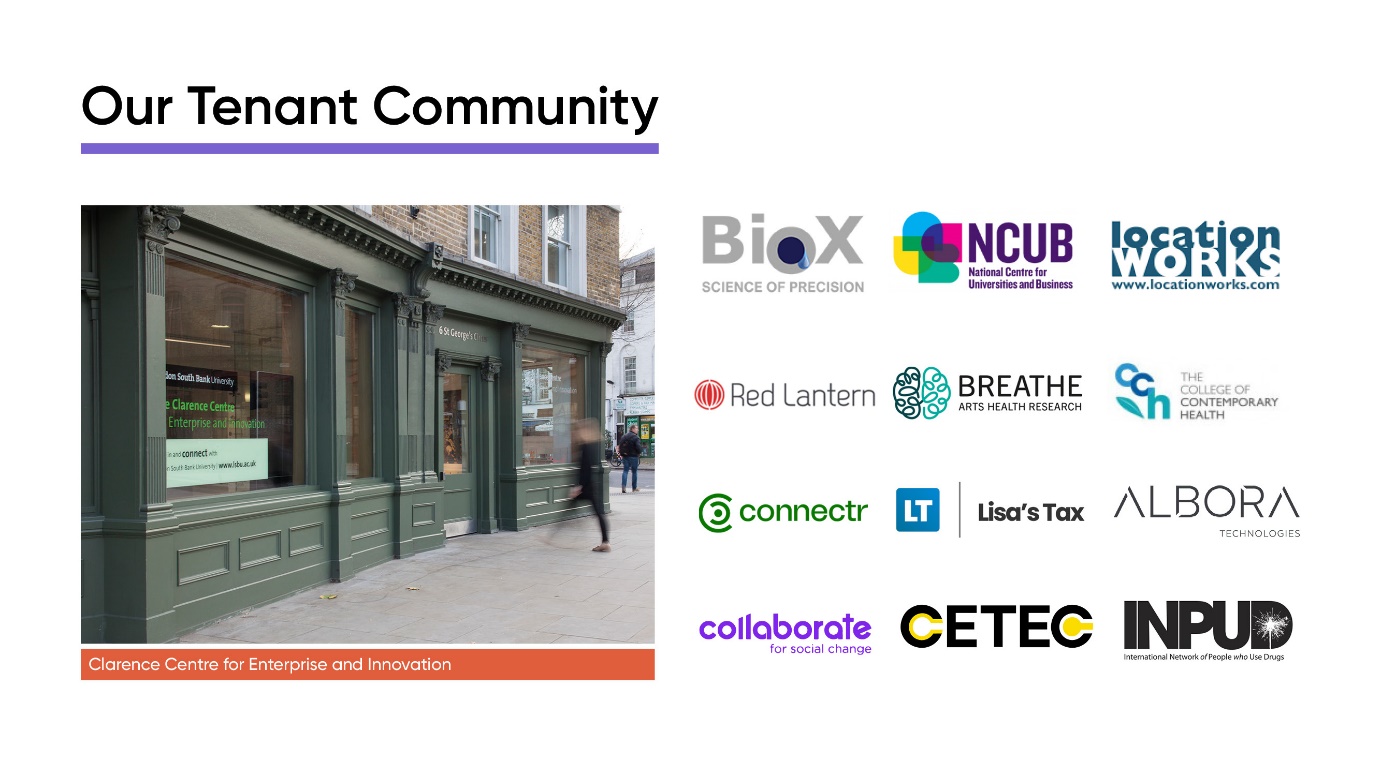
Skills Development
Delivery on our major skills projects is still at an early stage, however, initial impact and activity are positive:
We are one of the major CPD health providers in the UK, working with over 60 NHS trusts and training 1/5 of new nurses in London.
We secured GBP2,200,000 in 2021/22 for projects to upskill Londoners and help them into work in Digital, Health and Social Care, Creative Industries and Green Economy occupations.
170 participants have gained additional qualifications and skills, 72% came from ethnic minorities, 24% were long-term unemployed (more than 12 months) and 17% suffered from one or more disabilities.
88 economically inactive Croydon residents received career guidance, tasters, and employability skills; 70% of these were from marginalised groups.
Our programmes have delivered access to new opportunities, recently including:
Through LSBU’s Aspire programme, delivered in partnership with the Code Institute, London resident Ibrahim Bah gained level 4 skills in web development, helping him access new employment opportunities.
Ediz Sonuvar undertook a level 5 web development programme to help him start his own business.
Our Dagile delivery team worked with OldAlone, a charity committed to reducing loneliness, to provide IT support to local marginalised communities.
LSBU has partnered with Multiplex, a construction company based in London, to provide ESOL courses through Dagile. The programmes have helped Multiplex staff gain valuable language skills to support their integration into the UK workforce.
In 21/22 LSBU launched and delivered the government backed Help to Grow
programme across both our Southwark and Croydon campuses. Co-delivered
with the LSBU Business School and local growth experts, the programme
directly supported 241 SMEs to scale, innovate and develop business
resilience strategies.
LSBU’s delivery of Help to Grow was quoted by Paul Scully, MP for Sutton
and Cheam and Minister for London, as an example which “fully
encapsulated [his] vision for how the programme should be run.” We have
since been invited to share our learnings with other HEIs to support
delivery nationwide.
Public & Community Engagement
Summary of approach
LSBU’s civic mission was established with our foundation in 1892; to serve the needs of local people and employers. This remains core to our 2020-2025 Corporate Strategy; notably “transforming lives, communities, businesses and society through applied education and insight.” We bring this to life by working with democratically accountable local government partners to deliver the needs of our diverse local communities.
The Strategy is complemented by the LSBU Group Civic Statement, clearly stating our commitment to South Central London, with the aim to:
Provide high-quality professional and technical education to our diverse student body.
Work with businesses to promote opportunity and prosperity.
Support the transition to Net-Zero.
Support the health and wellbeing of local people.
Aspect 1: Strategy
We embed our approach to civic engagement across LSBU by explicitly including it in the University’s 2020-2025 Strategy and making ‘Engagement with Place’ one of the six key offerings of our mission. This builds upon the approach presented in our 2015-20 plan which identified:
Local Authorities are best placed to determine the needs of their electorate (which are among the most ethnically diverse in the country).
The University can make the most impactful use of our expertise and resources by working with these teams to support their strategic priorities.
This strategy was refined in consultation with local partners including the London Boroughs of Lambeth and Southwark, WeAreWaterloo BID, South Bank Employers Group, Better Bankside BID, Lend Lease, British Land and Guy’s and St Thomas’s NHS Foundation Trust.
The key goals of the strategy are that we positively contribute to the lives of one million people and generate GBP5,000,000,000 of economic impact; through our work with individuals; educational institutions; local, regional and national Government; representative organisations; local businesses; and public and third sector organisations.
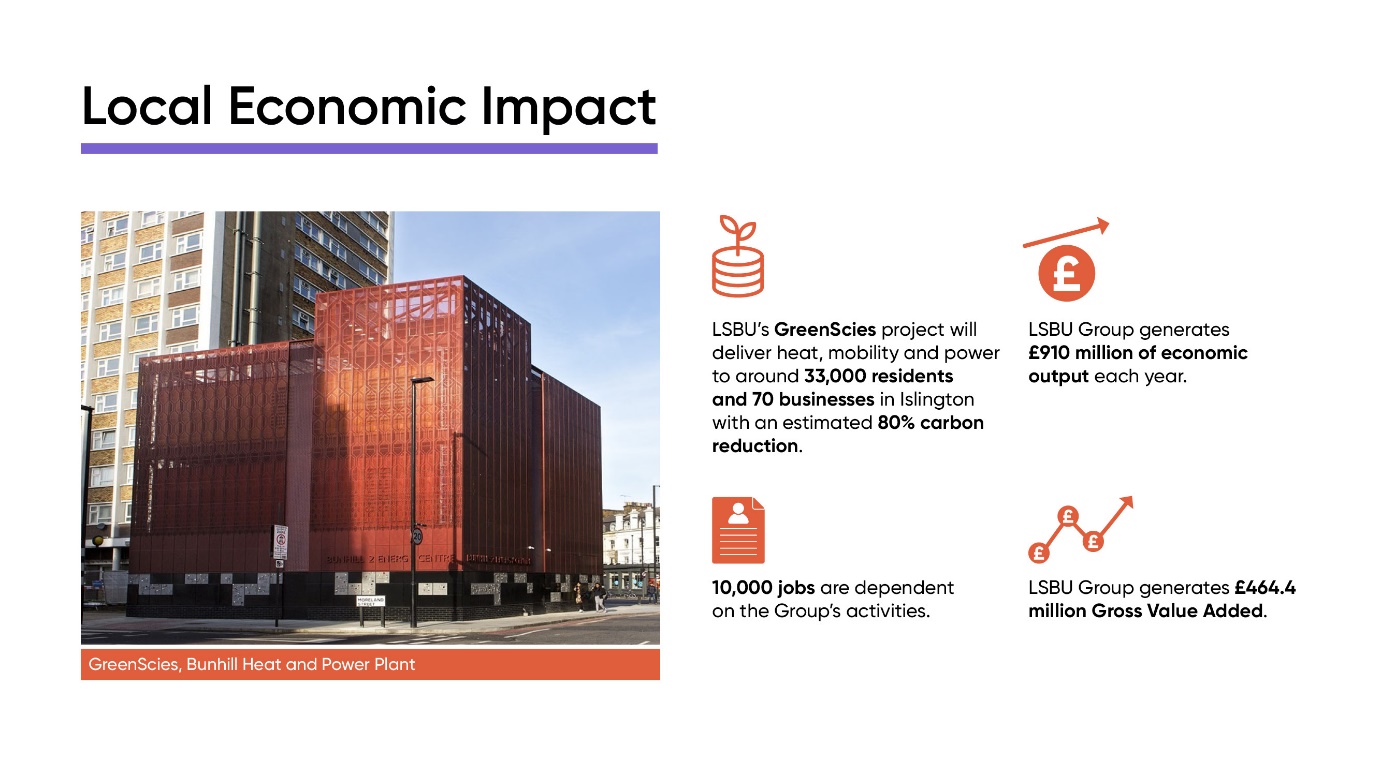
The Strategy is complemented by the LSBU Group Civic Statement and our EDI strategy, detailing how we aim to engage with our community and pursue our mission in collaboration with other organisations.
The University also has Memorandums of Understanding (MOUs) with the London Boroughs of Southwark, Lambeth and Lewisham, formalising our cooperation. While MOUs with colleges – including Morley College, Orbital South College Group, Croydon College Corporation, and Brooklands College – further support progression into higher education for learners across the Capital. Finally, LSBU has a Knowledge Partnership MOU with London Councils Climate Programme.
LSBU’s public and community engagement is coordinated by the Corporate Affairs team (through four dedicated staff members). Delivery of our civic activity is coordinated by the Policy and Stakeholder Engagement team, supported by both the Policy and Public Affairs and Corporate Affairs and Strategy teams. Activities are measured against a local delivery plan overseen by the Group Director of Corporate Affairs and, ultimately, the Deputy Vice-Chancellor, Academic Framework. This workflow ensures activities and the strategy are both aligned.
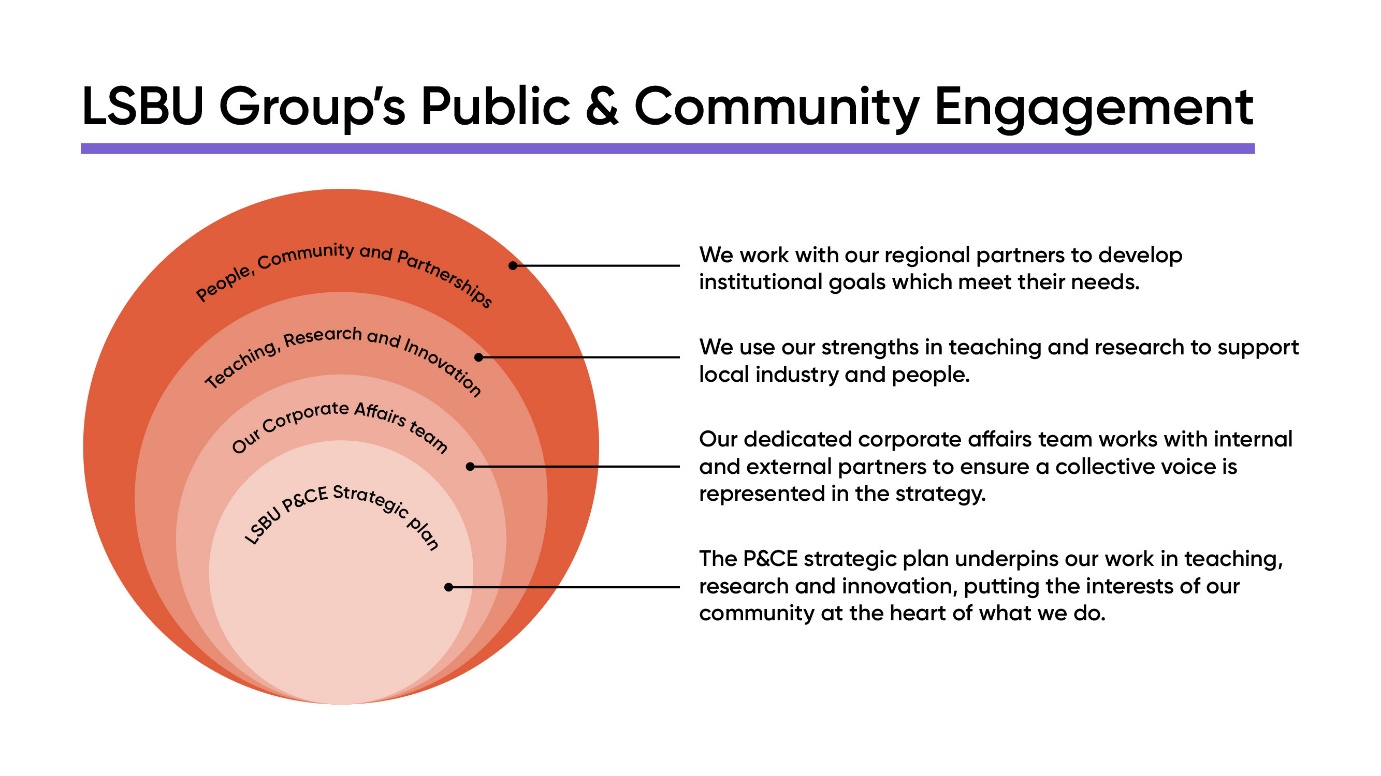
Resources secured and allocated to activities for civic and public engagement include:
Dedicated space and staff time to support our public drop-in services (Business Solutions Centre, Legal Advice Clinic).
Sponsorship of South Bank Academies, including dedicated University staff time to deliver outreach work and support curriculum development.
The Clarence Centre Business Lounge: a publicly accessible business support centre created through University investment.
LSBU’s Academy of Sport to improve public access to sports facilities (supported by GBP300,000 from Southwark Council).
Creation of the Borough Road Gallery to promote Borough Group artists (financed with GBP240,000 from the Heritage Lottery Fund).
Turning Caxton House on the LSBU campus into a publicly accessible space to promote Chinese language and culture.
Establishment of the Passmore Centre towards apprenticeships for Southwark residents (partly funded by a GBP5,000,000 grant from Southwark Council).
Creation of the LSBU Green Skills Hub, helping local residents achieve green qualifications and employment (in partnership with the Greater London Authority, which invested GBP250,000).

Aspect 2: Support
LSBU’s Corporate Affairs Team coordinates the
University’s interactions with local stakeholders. Working closely with
the Research and Innovation Office, they offer additional support and
advice to academics looking to engage with local or national
policymakers. They also manage civic-focused engagement, including a dedicated
website functioning as a gateway into the University for
potential civic partners, enabling collaborations with academic experts
from across LSBU’s Schools and other colleagues focused on knowledge
exchange.
Academic development is overseen by the Academic
Development Steering Group and the Researcher Development Group (RDG).
The RDG ensures that training and development activities are delivered
in line with the nationally recognised Researcher
Development Framework. This work has enabled the University
to be awarded the HR Excellence in Research Award four times since
2014.
Training for academics looking to conduct public and community engagement includes:
A training event by Parliament’s Knowledge Exchange Unit on achieving research impact with parliament, hosted by the University in January 2019.
A Policy Masterclass provided by the Cabinet Office’s Open Innovation team for up to 30 academics (GBP12,000 committed in 2022 for delivery in 2023).
Sponsorship of The Conversation (GBP16,000 per annum), enabling 50 academics to access training on how to transform their research into writing for a general audience.
Organisational development activities are aligned with KPIs within our Corporate Strategy, including those related to civic impact. The LSBU Group EDI Strategy commits us to various initiatives that improve diversity and inclusion, promoting inclusive recruitment and ensuring better promotion and progression opportunities for ethnic minority colleagues. Elements of this work saw the University shortlisted for the Large Business Team category in the 2022 Black Talent Awards.
LSBU also sponsors several organisations that help facilitate academic engagement with policymakers and wider public including:
The Net-Zero All-Party Parliamentary Group (GBP6,000 per annum)
The All-Party Parliamentary Health Group (GBP8,400 per annum)
External guidance is provided to each School through advisory boards, which typically include members from the local community. For example, the School of Business’ Curriculum Advisory Board includes local business owners and the Director and past Chairman of Southwark Chamber of Commerce. Cllr Jacqui Dyer, Deputy Leader of the London Borough of Lambeth, is also a Trustee of South Bank Colleges.
Staff achievement is celebrated regularly via all-staff newsletters, through our STAR (Special Thanks and Recognition) vouchers scheme and at an awards ceremony included in the University’s Staff Conference each year. This covers political and community engagement through the ‘Research in Action’ category, which recognises how the research at LSBU contributes to making the local community and world a better place.
For PhD students, our London Doctoral Academy provides a tailored personal development plan allowing them to develop the skills they chose – including how to engage with the public and communities. Students wishing to take part in community engagement through LSBU’s Legal Advice Clinic and Business Solutions Centre are trained by qualified academics to be able to give advice to members of the public.
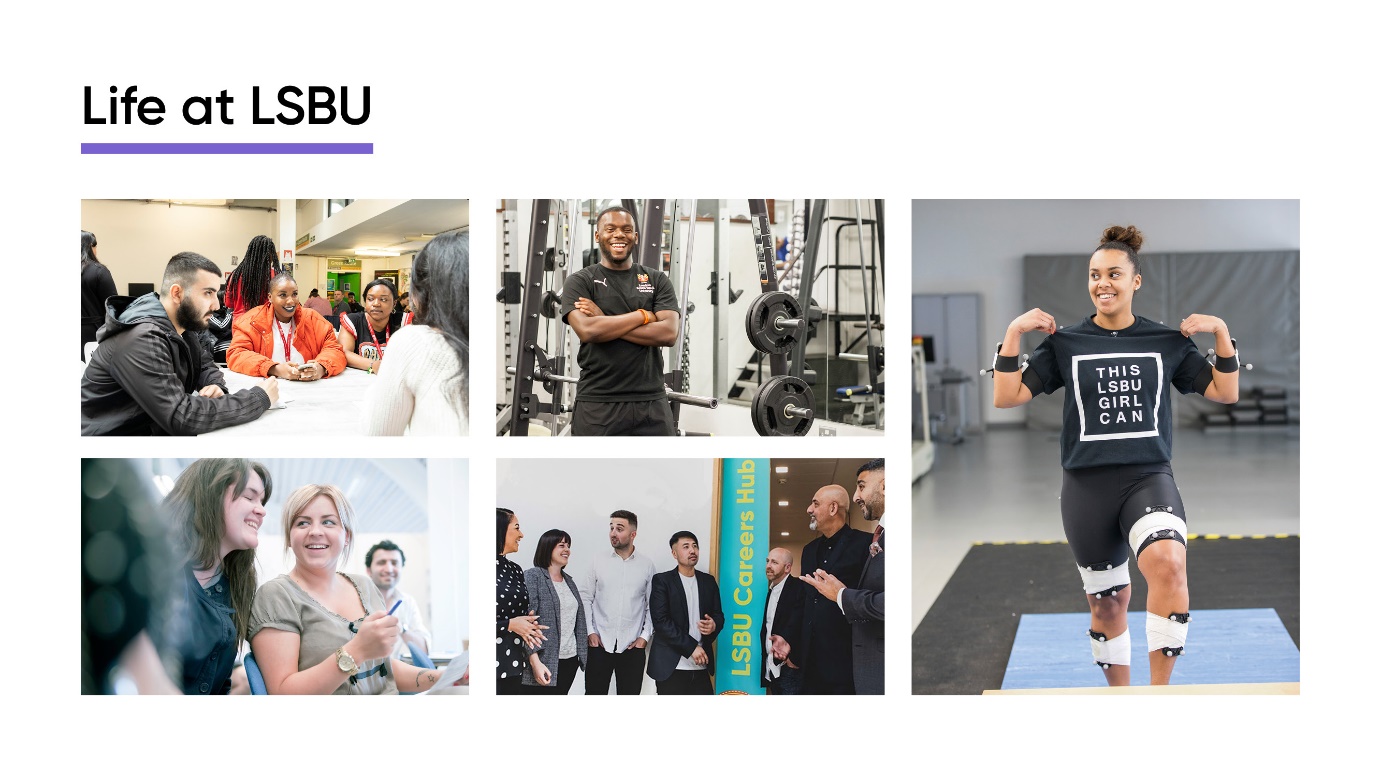
Aspect 3: Activity
The LSBU Group Civic Statement sets out four priorities in relation to our commitment to South Central London. Examples of activities relating to each objective are included below:
Providing high-quality professional and technical education
LSBU opened a new campus in Croydon in Autumn 2021, at the invitation of the local Council, to expand educational opportunity in the Group.
The University is part of LSBU Group offering educational pathways from Levels 1-8. Since 2021, we have been constructing a new GBP100,000,000 technical college (London South Bank Technical College) in Nine Elms to provide Level 3 and 4 technical courses for local learners.
The University holds free-to-attend public lectures throughout the year. During the 2021/22 academic year 17,240 individuals attended these events and we dedicated 1,957 days of academic staff time to them. Topics included: art, nature and sustainability, human rights, and psychology.
The EDI team holds ‘Let’s Talk’ sessions to discuss topics including Autism, Black History month, feminism, diversity bias, menopause, and LGBT+ with over 460 attendees in 21/22.
LSBU acquired the Foundation for People with Learning Disabilities in 2019 to ensure the continuation of research in neurodiversity and The Other One Show, an online show to raise awareness of learning disabilities.
Between September 2019 and June 2022, LSBU’s Confucius Institute worked with over 50 different schools and approximately 30,000 HE students providing lessons in Mandarin Chinese, martial arts, Chinese dance and calligraphy.
Working with business to promote opportunity and prosperity
The LSBU Business Solutions Centre (a free drop-in service for local SMEs) employed and trained 61 students between 2019-2022. These students collaborated with 96 clients/businesses under academics’ supervision. In 2022, this included three referrals through the Government’s Help to Grow scheme and ten from the Greater London Authority’s Wayfinder programme.
As of August 2022, LSBU has supported 156 businesses through the Help to Grow: management programme, providing personalised training on areas such as financial management, leadership and digital skills.
In May 2022, LSBU hosted the BIG South London Future’s Conference. This unique event brought together over 60 academics (including from LSBU) and local Government professionals to discuss the future of South London’s highstreets and townscapes.
Since 2020, Lewisham Council have appointed LSBU Business School academics to conduct:
A five-year longitudinal study of post-covid high street health, particularly focussed on Black, Asian and Minority Ethnic business owners and long-term changes to high street viability and character.
A post-covid usage and attitude survey of visitors to Lewisham Town Centre.
A study of Dark Kitchens across the borough.
Southwark Council have appointed LSBU Business School Academics to engage with the 500+ independent traders on Rye Lane in Peckham to establish a local business forum with support workshops.
Supporting the transition to Net-Zero
In February 2022, the University launched the LSBU Green Skills Hub in partnership with Lambeth, Lewisham and Southwark Councils, along with twelve London-based businesses and four other education providers. The hub will create 382 jobs and apprenticeships, plus 119 work placements in the green sector by April 2024 and provide 1,230 qualifications to local residents.
In 2022, LSBU received GBP150,000 from the Office for Students (as part of their HE Short Course trial) to develop four new Net-Zero short courses to train up to 180 individuals working in the building, housing or green sectors each year.
Academics from the University have sat on the advisory groups of both Lambeth Council’s Citizens’ Assembly on Climate Change and Southwark Council’s Climate Change Citizens’ Jury, and currently sit on the Steering and Practitioners’ Groups for the London Councils’ Retrofit London programme and the City of London’s Skills for a Sustainable Skyline taskforce.
In November 2022, LSBU Croydon hosted the London Schools’ Climate Kick-Start Event, enabling 300 South London School Children to learn about careers in the green sector.
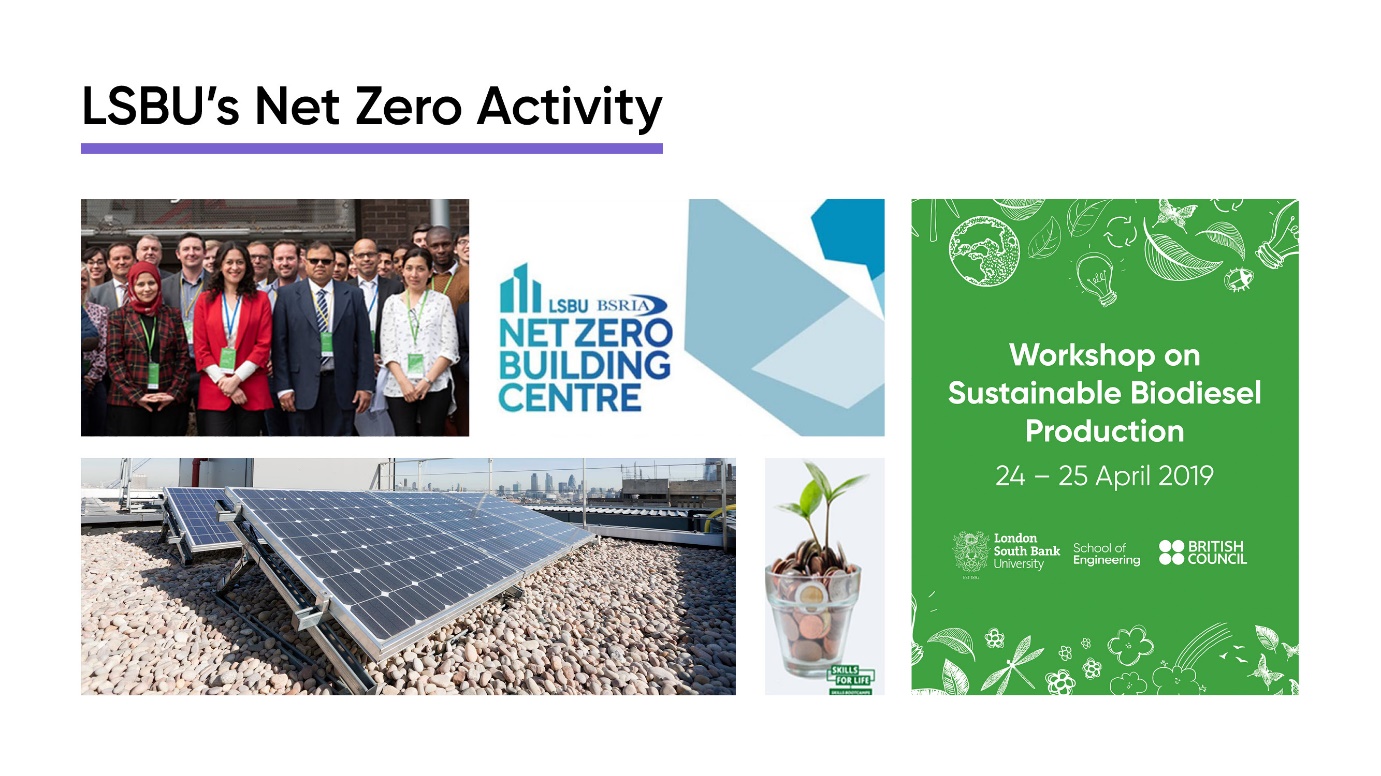
Supporting the health and wellbeing of local people
A collaboration between LSBU’s Institute of Health and Social Care and Tower Hamlets Council sent out 2,370 home urine testing kits to South Asian heritage residents. Almost 37% of the 60% targeted residents who returned the test, showed abnormal urine protein levels, which could be a sign of kidney disease.
LSBU’s Confucius Institute offers affordable Chinese Medicine treatments to the local community including acupuncture, cupping and Tuina massage. Over 1,000 acupuncture treatment sessions were delivered to LSBU students, staff members and external clients in 2022.
In 2021, LSBU and the Croydon BME forum launched the Croydon barbershop project. This trained eight barbers to provide on-the-spot blood pressure checks and health information to clients. The project targets Black and Asian men who are likely to have high blood pressure but less likely to be diagnosed than the general population.
An LSBU School of Applied Science academic has led a world-first trial measuring the efficacy of using e-cigarettes to help homeless people quit smoking, using a GBP1,700,000 million grant from the National Institute for Health Research.
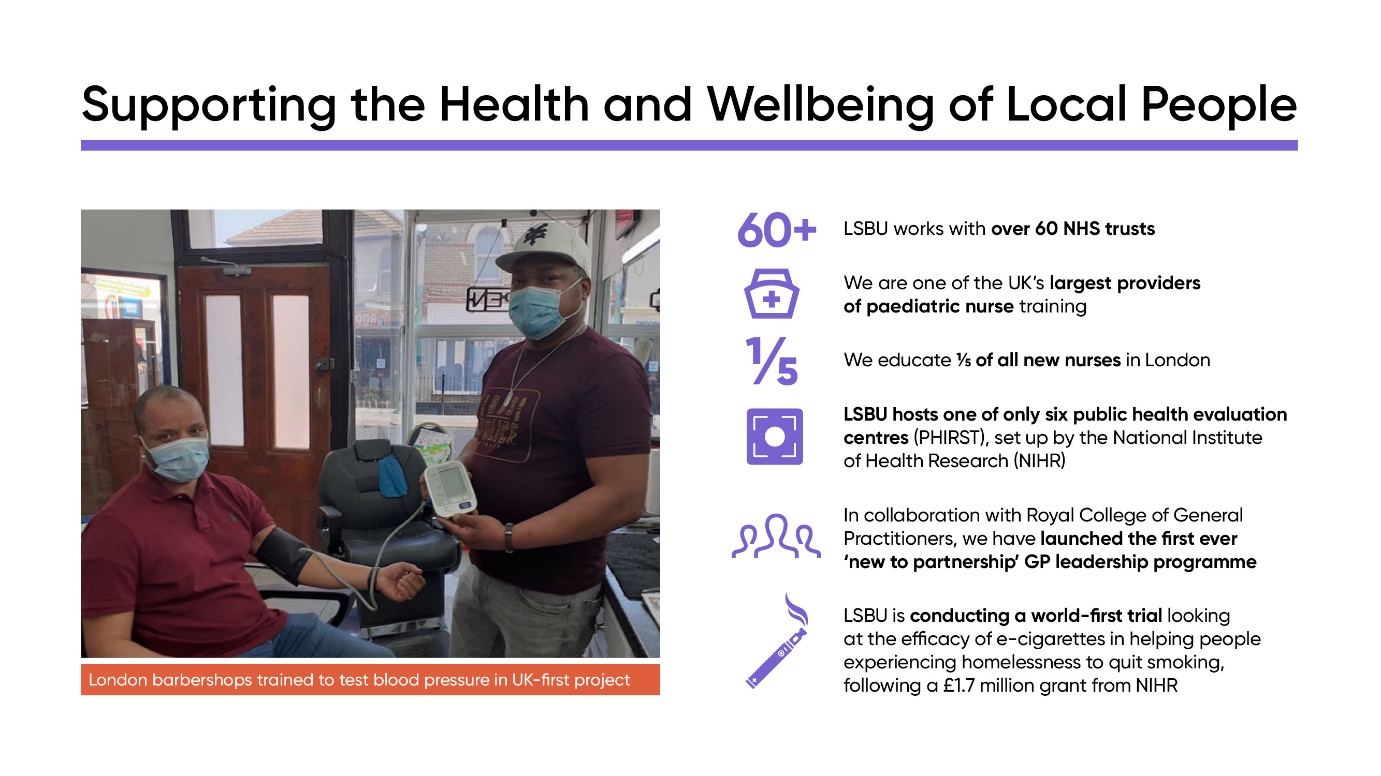
Aspect 4: Enhancing practice
Each of the four pillars set out within the LSBU Group Strategy aligns with specific UN Strategic Development Goals (as seen below).
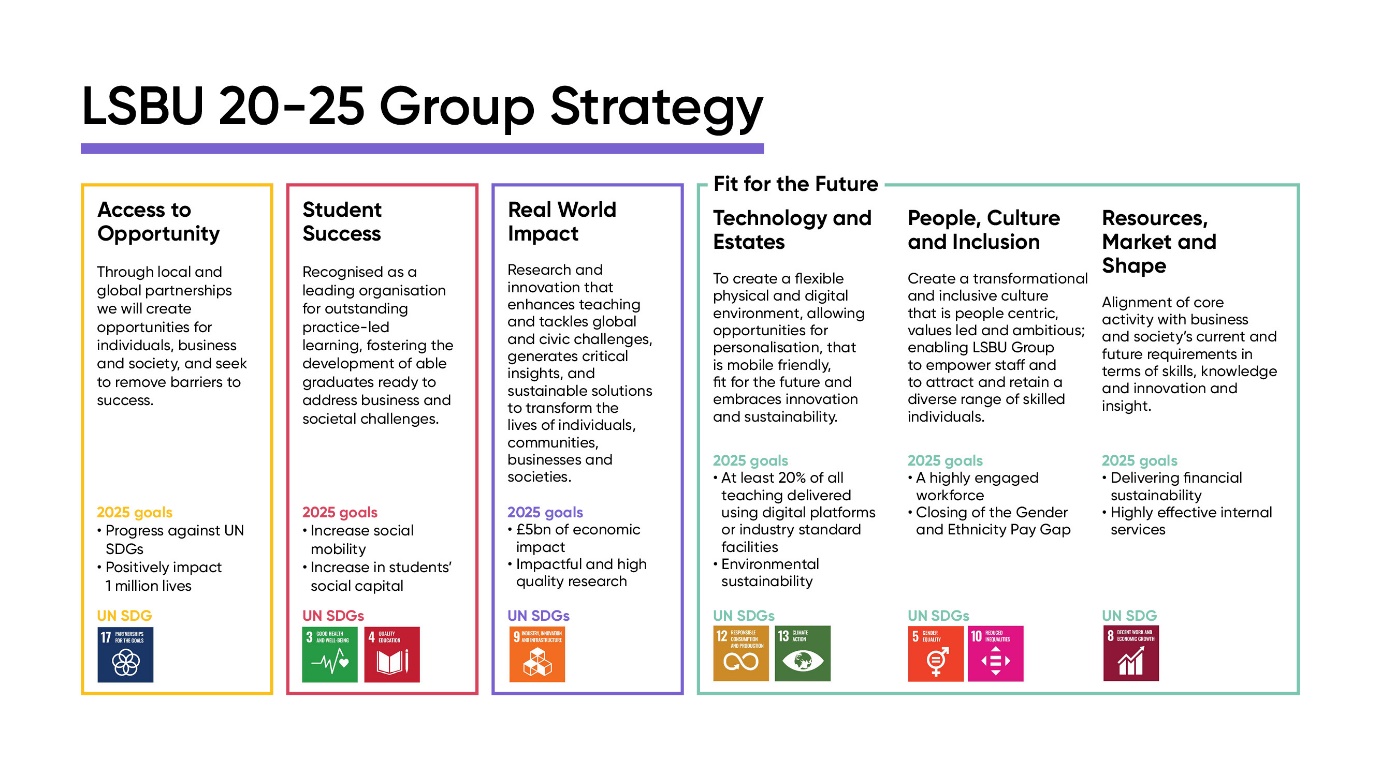
LSBU Group reports through its Annual Review the activities that have taken place in the previous twelve months that have contributed towards each SDG.
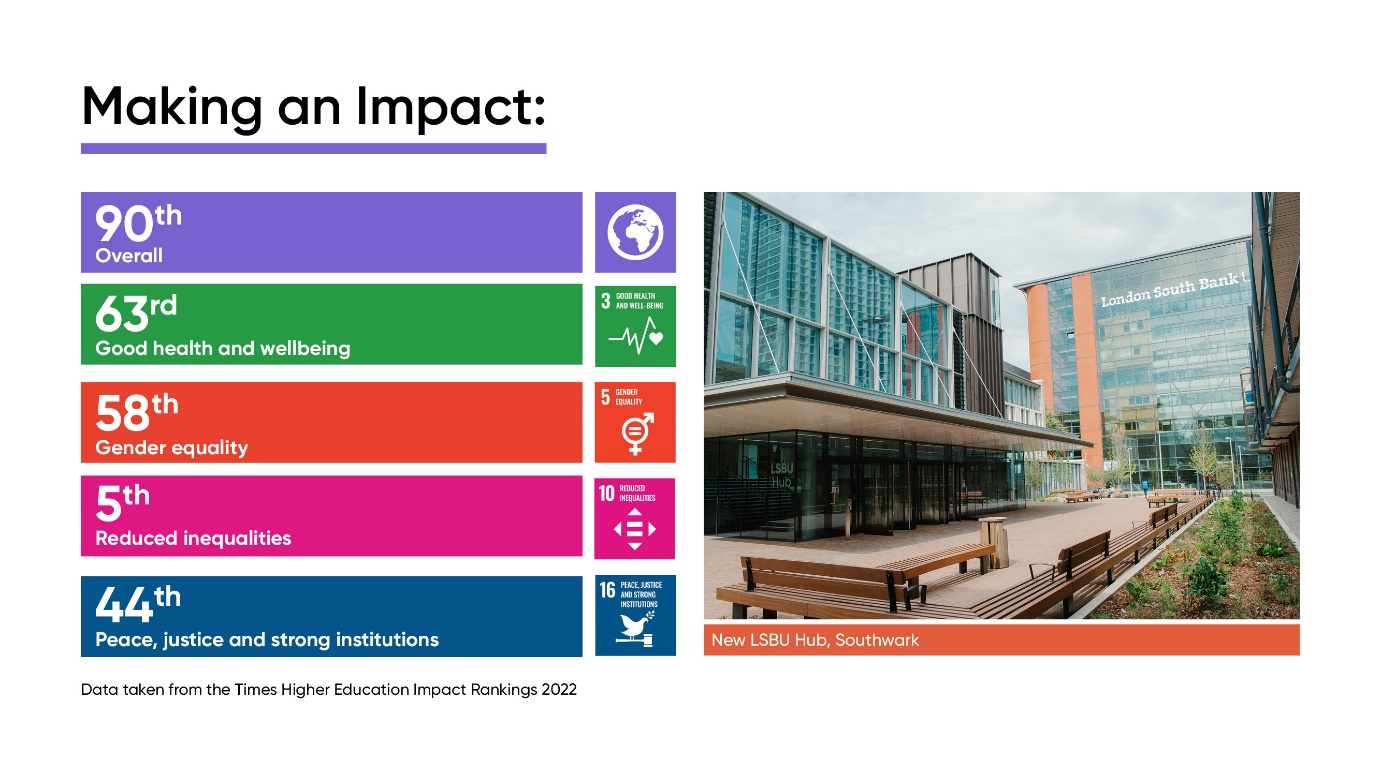
Bids for research funding related to public engagement, whether from external research councils or internal LSBU funds, require researchers to set out relevant KPIs (governed by the University’s Statement on Responsible use of Research Metrics), which are assessed at the end of each programme.
The University frequently evaluates its relationships with local partners, including having regular meetings with its local Councils to renew its work-plans and has committed to renewing MOUs, periodically updating them to reflect changing priorities and ways of working. The University has found through this process that principles-based agreements – which can accommodate shifting priorities and staff members – provide a more effective method for engagement, with the refreshed agreements reflecting that. Our MOU with Lambeth Council was renewed in October 2020, while our MOU with Southwark Council was renewed in 2021. This has been complemented by the sharing of MOUs between Boroughs to determine best practice. The University has found through this process that principles-based agreements – which can accommodate shifting priorities and staff members – provide a more effective method for engagement, with the refreshed agreements reflecting that.
Additionally, the University participates in a wide range of Council Forums such as – the Southwark Anchor Network, Southwark Skills Partnership, Lambeth Skills and Employment Board and Lambeth Climate Partnership Group – which help provide feedback and guidance on the University’s existing initiatives and alternative potential approaches going forward. This work has ensured new University initiatives – for example the LSBU Green Skills Hub – reflect the current priorities of the Councils and other local stakeholders.
Finally, the work of the LSBU Group – and particularly its relationship with South Bank Colleges - has been formally reviewed by both Ofsted and the FE Commissioner, providing feedback to inform further development ahead of future inspections.
Aspect 5: Building on success
When developing our 2020-2025 Corporate Strategy, the University reviewed the public and community engagement that had taken place during the previous five-year plan and determined that embedding our civic engagement from a strategic perspective – by making ‘Engagement with Place’ one of the six key offerings of our mission – would help to enhance our public and community engagement.
In 2022, the University formalised this further by publishing the LSBU Group Civic Statement. In one document, this captured the existing agreements between the University and its local government and education partners; and set out four key commitments to our local area (detailed in our Summary of Approach).
As stated in Aspect 1, the Corporate Strategy was refined with input from our key local stakeholders. Internally, colleagues were also engaged through the ‘Shape our Future’ initiative, which was shortlisted in the Organisational Development and Culture Change Category of the 2020 UHR Awards. A similar exercise will be carried out in 2025 to assess its success and identify areas of improvement within the current corporate plan, as well as reflect on priorities for the 2025-2030 Strategy.
Following KEF1, the University reflected on how it had been helping academics engage with policy makers, and decided to create a more formal process by sponsoring the Net-Zero and Health All-Party Parliamentary Groups (which align with priorities 3 and 4 within our Civic Statement). This sponsorship has resulted in LSBU academics speaking at four parliamentary events as well as feeding into APPG publications and reports. Similarly, our sponsorship of the Conversation has enabled LSBU academics to publish 11 articles on the Conversation website, with a combined total of 2,853 reads.
For the 2022-23 academic year, the University has made available GBP38,000 (funded by Research England’s QR Policy Support Fund) for live research projects to enhance their chances of impact and public and community engagement. The University also has an External Participatory and Collaboration research fund (using GBP20,000 funded by Research England) that provides funding for academics to engage with research end-users/beneficiaries in research co-creation.
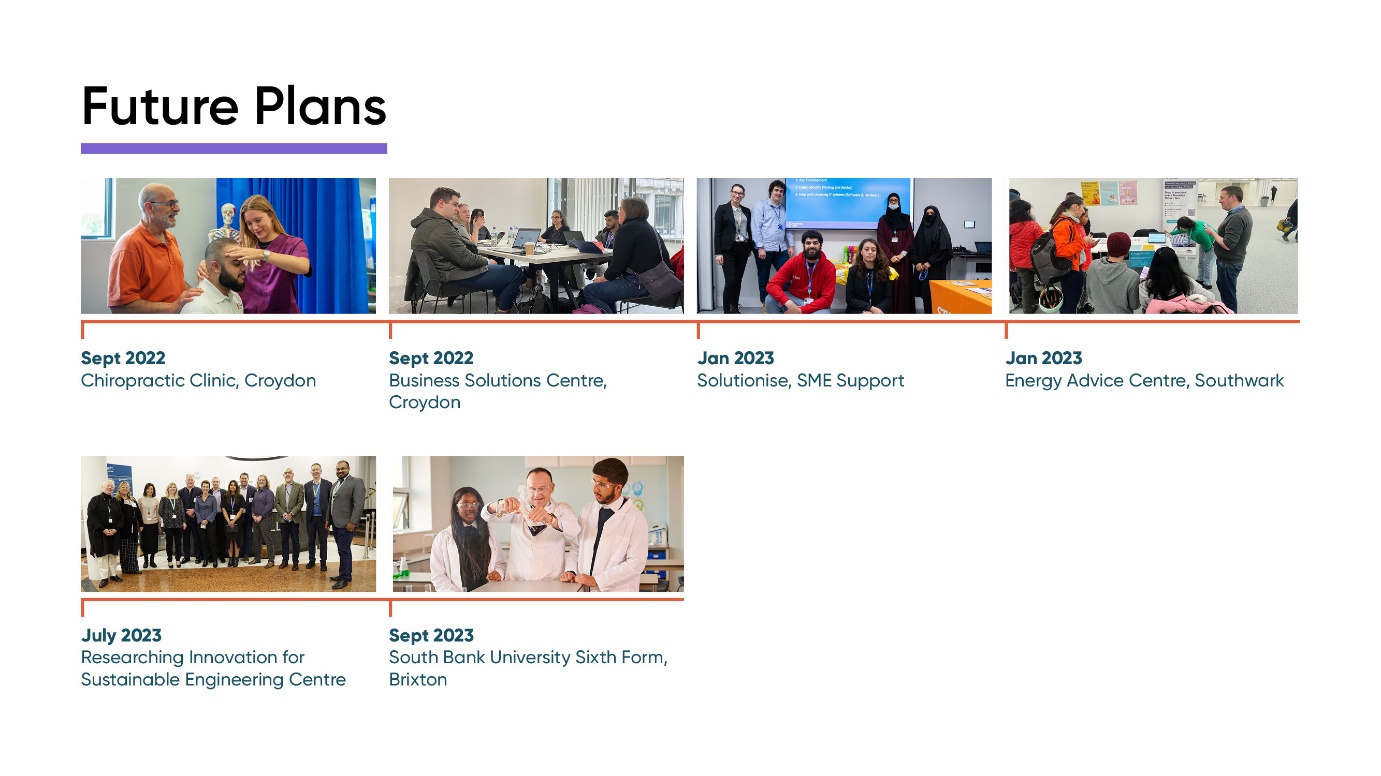
Note You are currently viewing the latest version of this narrative statement. View the previous version as published in previous iterations of the KEF (KEF1 and KEF2)